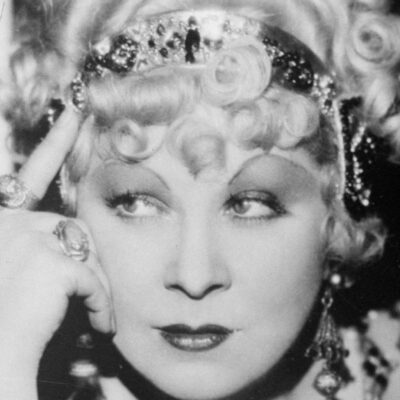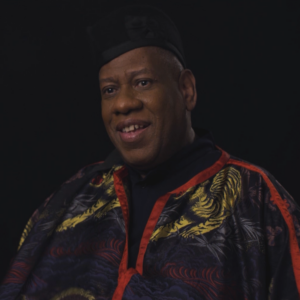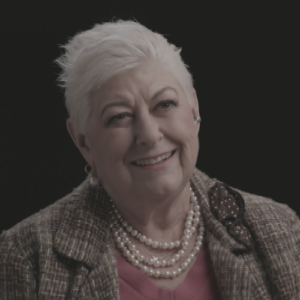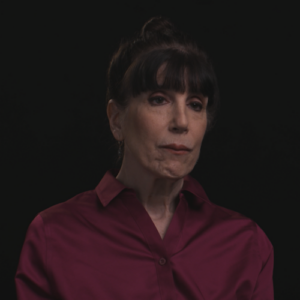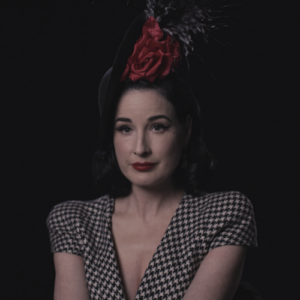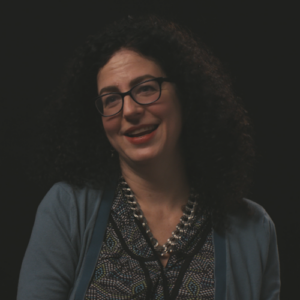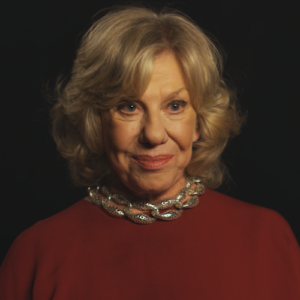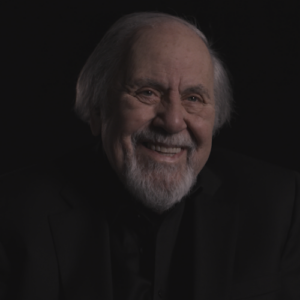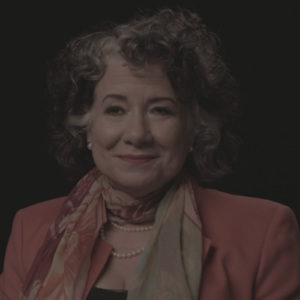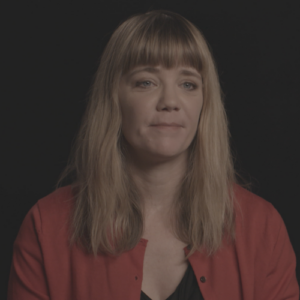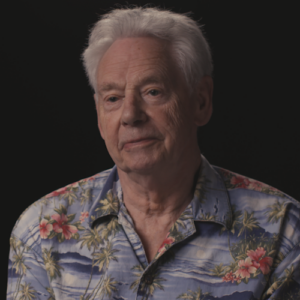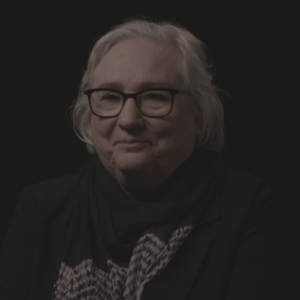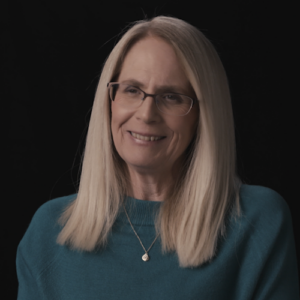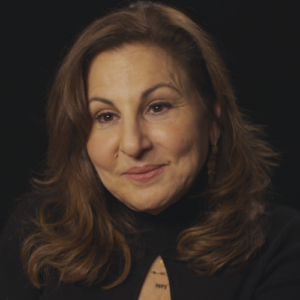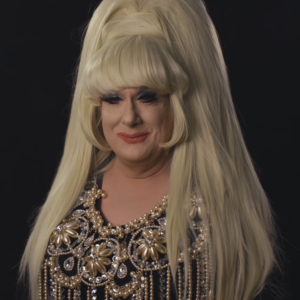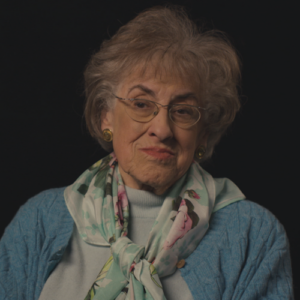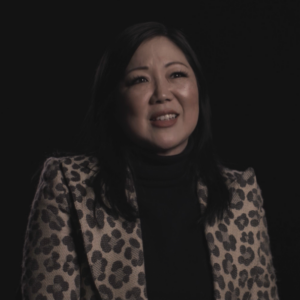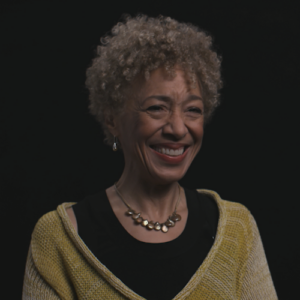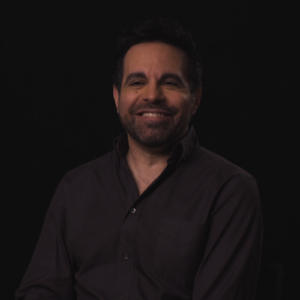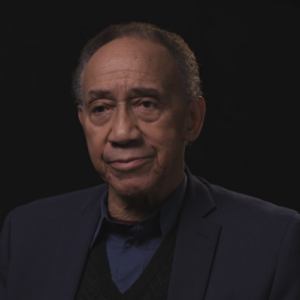Kevin Thomas: Mae West, to me is one of the most influential public figures of the 20th century. She was a greatly gifted, highly original comedian, master of double entendre, endless innuendo. She could make anything sound, suggests what she did with all that was to proclaim that sex could be fun and that pleasure is not a sin, and that women have the capacity and the right to enjoy sex just as much as men. That, to me, is what she was all about. At the essence. Now, Mae was her own creation. Now, having been put on the stage at the age of five. She played large halls and then she went into a stock company and playing melodramas as a child. And then finally, she made it into vaudeville. And at a certain point, her mother, Matilda, who was a big positive force behind her. You’re ready to write your own play. You’ve always written your own material and all your vaudeville acts. And that was, of course, sex. And that was different from what was coming. It was a melodrama or skewering sexual hypocrisy. And then that she really, really discovered herself with Diamond Lil, which premiered in 1928 when she was 35, with 30 years of showbiz experience of how to reach an audience, how to sing, how to dance, how to act out a present personality. And I think the great thing is that she discovered the corset and she told me, corsets are okay if you have something to hold in. And that’s where she got this hourglass figure image and all image all came together there. She did modern day things as well as period things on stage and screen. But she had created an image that would be an indelible of the hourglass figure and the central expressions and unique style. And her entire life was dedicated to preserving that. She owned up to having an enormous ego and she was smart enough to make fun of it. But she actually really believed that she all this hard work that if she ever died, she would have to continue on another plane because she had done so much hard work. You know, I mean, this is what she would more or less say. And the thing is and saying that she was her own creation. I have to point out two things. Our crucial one is that Eva Tanguay, who was a great vaudeville star and her career died with vaudeville just like that she was. I’ve read a lot about everything by and she was bold. And her famous signature song is I Don’t Care. I Don’t Care. And she would come out in front of an abbreviated outfit and shit. But she was, I think, from my impression, is raucous and brassy. And ah, but she did pave a way, I think. And what kind of meant probably agree with me on this and that for a certain boldness, all that paved the way for me. And when she was ill and destitute in Hollywood, she wrote me a letter saying, I need $10,000 for an operation and I want from you, you stole everything from me. And it’s debatable whether she really stole a soul mate. Stole so much because they were different style, but may center the certain styles and dollars. Tim has. Tim Markowski has the letter. Okay. So but the key influence. The key influence was a fabulous female impersonator of the twenties named Bert Savoy. Bert Savoy. Oh, Chris told me that that man told him that Bert had said to her, exaggerate everything. Now I have some material. On birds voice. And there is a picture of him and it’s a Victorian gown and the big picture hat. If you didn’t look closely, you would think it was May. And I think she really took his advice to heart and I think those were the way paper and this one, these things. But then everything else, I think, came out from herself. And it’s it’s really important for people to understand that she either adapted or reworked or wrote from scratch all her material now, all the famous quips up to the expression was up to her hips and quips are all the memorable quotes were hers. And I’m of the opinion that after Oscar Wilde and Shakespeare, she is really the most quoted dramatist. My favorite of all her famous quips is, Is that a gun in your pocket or are you just glad to see me on one day, I guess, for her. So they are fabulous living room or wherever. I said, you know, where did that line come from? I mean, she finally used it in sextet, but I mean, I said, you know, I’m pretty familiar with all your movies and some of your plays. I said, But I don’t remember that line. And she laughs. I’ll tell you the story. She was going to be arriving on the super cheap or whatever. Yeah, Pasadena or L.A. And you probably know that back in the day when a big star was arriving in town, either New York or here or Chicago, what I thought was a hell of a lot of press photographers and and journalists ready to greet you and, you know, ask you questions. You know, that’s was part of the whole thing. So anyway, now, since the story artists are district attorney in the thirties was had a wonderful name. Straight out of Raymond Chandler or Tache Buren Fitz and Buren was had a very serious meeting that he could not miss and he couldn’t go down to the station and meet her personally. So he lined up the handsomest uniformed deputy sheriff he could find and gave him the expression and gave him the instructions that he was to go up to me, lean over her, and plant a kiss on her cheek and say, This is from Bureau. And then she said and I said, Is that a gun in your pocket? Are you just glad to see me now? That’s my favorite of all stories. I just think that is so funny. You’re wonderful. Now, as it turns out, Bjorn was very important in another situation. One of the really important people. And his life was the number one gangster in New York. Only mad. Now Owning was co-owner of the Cotton Club. He backed a Texas guidance famous speakeasy, the L Fe and all. He wanted to come out and visit me and she was big star of Paramount by that time. And he was, of course, persona non grata in L.A. But Mae called her pal Byron and said, he’s a good guy. She’s kind of dubious, but, ah, he said she’ll spend the entire week in my apartment. And so Bjorn said, okay. And so it came off. Now, our name was very, very important. Battling Jack, her father, once this prize fight days were over. He was not exactly found his way to any steady employment. And Matilda, her mother, who was a frustrated actress, always amused me. It was okay with her family to work as a corset model but not go on the stage. And and finally, Matilda took a job running a roadhouse on Long Island, and that was her introduction to the underworld and and only mad. And she fronted the Hastings Hotel at around Times Square for him. And it was Matilda who introduced my mother. Our own mother. And may I say to me, so sweet and so vicious. And she was really impressed that he had taken 26 watts and lived to tell the story. Well, ironically enough, after he things got hot, he tired to Hot Springs, Arkansas, where he took over the underworld there. And when he was dying, his nurse was Bill Clinton’s mother. He mentions this in his autobiography. And when he died, he was down to 13 bullets. And men would say, oh, he was going to hospital every once in a while and got another bullet pulled out. And anyway, the one time be well, they were saying there was a certain blond who was backing a show on Broadway that backing from only. Well, I was the blond and the show was Diamond Lil. So he was very crucial and all of that. And they stayed in touch. I mean, she always stayed in touch with the men in her life. She was so wonderful about writing her own material and she knew what she wanted to do and where she wanted to go with it and all those wonderful films and all those fabulous throwaway lines and stuff. It was really I mean, what happened or how she came to come to Hollywood was that Texas Guinan was to have this role and George Kraft’s 1932 movie night after night, but she died. So George suggested may now may have known him because he was a driver for Owen. And one of his assignments was to drive me any place she wanted to go shopping. And so they knew each other. And he would dance at the El Fey and she wanted him in Diamond Lil, but he was very unsure of himself delivering lines and things like that. But 532 you know, he was a big star at Paramount. And of course, he famously said she stole she was the works and she stole every. But the cameras. And of course, she had more than the great entrances of all time. When she goes to the casino and checks her furs and at check, Girl says, Goodness, what? Diamonds? And she said, Goodness, I had nothing to do with it, and sashayed up the staircase. But I think that’s pretty well known. But anyway, Aunt May was very high. It was very striking, showing a look like anybody else. I think she was blessed. Well, what My grandfather’s famous term, famous from the valet, pleasingly plump figure all her life. And I mean, I think that helped her age. Well, because she didn’t get angered or or I mean, she was full bodied. And so and she had absolutely most gorgeous skin you can ever imagine. She took extremely good care of her complexion. And she was blessed with very sensual figures. She had a slightly flared nose and very sensuous lips after dinner. It was always fun for her to get her gold compact out and look at the little mirror. And she was so expertly replanting her her from her her makeup. And I think that what she did was that at a certain point, she strived for an ageless look. And I feel and a large extent, she actually got away with that pretty well. Jim Bacon, who was a wonderful guy and he was a piece Hollywood columnist for years, and he worked for other outlets later on, Hollywood Reporter and so on. He was such a terrific guy. And he once said of me, she doesn’t look young, but she doesn’t look old either. And I thought, that’s really nailing. She went from sort of ageless call and sustained her pretty well for overall, she looked pretty good right to the end. And, ah, when Paul Novak came at her life, he got a hold of her diet and and and exercise regimen. He was very good about that. But Paul was absolutely a wonderful, wonderful man and one of her great confidantes, along with her friend Dolly Dempsey. She had all had written many such wonderful letters that most of the people who worked at Paramount took charge of fan mail. So that’s West. I think you might be interested in these. Dolly would write about herself and her life, which was unusual. Her fan letter and shoot. Dolly was very sharp lady. She was an executive secretary. But she would also say, oh, may that last movie around that dress she wore and this image didn’t do you any favors. I mean, who you know, And 45 years later, it was Dolly who was holding nice hand when she died. And her other great confidante was her Herbert Herb Kenneth, who was a really major TV sitcom director. Norman Lear, I love Lucy. You know, he had a but he had started out as the stage manager when she took the revival of Diamond Lil on tour. And this was in the late forties and early fifties. And I mean, she went with him with her all across the country and what how close friends they were when she wanted to do sextet. Herbert said, No, I won’t direct it and you should not do this film either. She went ahead anyway, but it didn’t affect their friendship whatsoever. Now, May was said of her friends. My friends are people who are interested in me. Now, all the years I knew her. She never asked me how I was or what I was doing or what was new. But on another level, she was very concerned about the people in her lives and in situations and institutions beyond her. But this was very private. I mean, I think she wanted the public to think that she was the shady lady on screen and she lived a life of pleasure and leisure. And the longer I thought about it. I think she’s one of the hardest working women in showbiz, because if she was doing one thing, she was all her her. Her phrase was next. What are we going to do about next? And of course, sextet after Fabulous premieres and L.A. and San Francisco. I was with both of them. I mean, they were jam packed and and people were wildly enthusiastic. And of course, then they were a dud. And then when they went into regular run and Herman told me and said, you know, I guess the subject of the picture came up here and there. And she said, Why? I have to think about what I’m going to do next. And that was then. Then it was always forward thinking. Now, she was unbelievably such fun. You can’t believe a man was all that you would hope and more. She loved to be in a group of people that she knew and trusted and could relax. But and she would ever she wished she didn’t. She knew that she was the center of attention so she didn’t have to claim the spotlight, other work or free flow conversations. And she would love when Paul would relax because he was a very sober, sweet, wonderful, wonderful, dear man. As Herbert said, I loved them both. And I said of all her, I do too. Then Paul would relax and he would tell funny stories, and he’d be and he would be alive. And he would start being very stern and being the protector and the bodyguard and all us guardian stance of his. You know, he said, I believe that God put me on this earth to take care of Miss West. And he did. He did. He did to her last breath. He was just wonderful. And so everybody could have a chance. But she also if you if you passed the bar to be in her presence in an intimate, personal situation, it was important that you enjoyed herself, that that you would be entertained and she would tell wonderful stories and funny things that had happened to her and her incredible life. And then she would get up and sing one song. And the one that she loved to sing most was Moving Day, which was the very first song she ever sang in public, which was five years a Moving day movement. And it was just she was an upper and you came away so accelerated it sometimes was hard to get to sleep because you’d had so much fun and you had this. She was she lived in the moment. She had this great capacity for living in the moment. I mean, she she was she was smart. She was extremely grateful for her life. She was increasingly grateful that she had had this fabulous career that she had carved out for herself. She she knew she was lucky and she knew she, you know, fate was with her and everything of. But she, as I say, she wanted her friends to enjoy themselves in her presence. That was important to her. And she was so much fun. I can’t tell you.
Interviewer: I want to go back to vaudeville for a minute. Yes. A couple of questions. The red things that called her a tough girl.
Kevin Thomas: Yeah. And what Cam told me once and he may have told you that she was of a generation of tough girl singers, and he would know more about who those singers were. And he may have told you who some of them were because he’s the music expert. But he’s used that expression to me. And yeah, I mean, I don’t quite exactly know what it means. I know that there are sheet music, sheet music that she’s on on the cover. Like there’s a one called Good Night Nurse. But I don’t know about the the songs and things. Now I can tell you several things about the vaudeville days is that once she was in Chicago and she went to a famous South Side club and she and the customers were doing a no dance that she had never seen. And she was called the shimmy Wobble. And she said, okay, that’s for me. And she dropped the wobble and she introduced the shimmy. Now, this is a good story. She decided that she would have a jazz band behind her and not in the pit while she was out there doing the shimmy. Okay. Now, as it turns out, the violinist name was Dr. Jule Styne, who was working his way through medical school, was an ophthalmologist, but he was booking acts which became M.S., a music corporation of America. And he was so successful that he he bypassed a ophthalmology career. But he was that’s what he was. He was two years younger than me. And so he signed on to be. The violinist. And she said to me one day, she said, Mm hmm. That Jules played a mean fiddle. And then my dear friend Carmel Meyer’s silence star who’d come back to Hollywood after 25 years in New York. She had an apartment. And Jules and Doris Stein had been friends of hers in the thirties when they were both hostesses at stuff. And Jules and Doris were really kind to Carmel when she came back and her seventies. And things were tough. She had a little dinner party and she sat sat me with Dr. Stein and Doris Stein, who was quite a party girl and full of fun. And to break the ice, I said, Dr. Stein, we have a friend in common name West. And he said, Oh, my God. Mae West. Mae West. He was so relaxed and full of fun. Jill Stein. And he said, Oh, I remember him. I remember on the publicity, boys came up to my office and said, Now we have written this all out. All you have to sign off at National Enquirer. Going to say that you were Mae West lover and all. You have to read this and then just sign off our own little world issue, this denial to the National Enquirer. Well, I guess it was National Enquirer. And he said, Hold it, boys. Because it was true. Oh. And he told Stan Musgrove, Mae’s longtime publicist, who was really the way I got to know it was through Stan. Stan told me that she also said it was a truly breathtaking, fabulous experience and they stayed in touch. And I have a picture of myself with Paul and Mae and I leaving the dedication of the Jill Stein Clinic at UCLA because she was invited to the opening. And so we came. And I just think I think she even maybe went to see him and he had a period of illness. I’m not pleased about that. But anyway, that was Joel Stein was another hurricane’s hurt conquests. You know, and then the. I want to talk about something else about the men in her life and her her image. From what I can tell. The one time that she fell in love hard with was an accordion. His name is spelled dir0. And I think that may be pronounced dero, perhaps. Well, I saw one of those photographs, short shorts that Warner Brothers put out in the very early talkies era. Fabulous record of vaudeville entertainers, UCLA Film Archives, legions. Well, anyway, here’s this guy, and he he’s a virtuoso on this. And he is tall and dark, but he was Italian and broad shoulders and just thick, dark hair and really strong, handsome features. I said, I get it. And they had a tremendous romance. And he was following on. And she was really falling in love with her. And she was trying to get booked on the same vaudeville tours that he was. They had met on a ball, got going, and then Matilda stepped in decisively. She said, You are in danger of ruining your career. You have got to break this off and think of your career. And I think it helped that he was insanely jealous of her. And she did that. And I think that this was the beginning of the whole thing. You look at her movies and stuff, she that the guys are falling in love with her rather than she. Falling in love with them. Now, I have said in print and all that I the thing is, this is what is very important to understand about me. As of all the remarks she made, the most significant is of Diamond Lil. I’m her and she’s me. And they were fuzed. As time went on, as Richard Merryman wrote in his wonderful interview with her when she was going to appear in Mirror and that was a beautiful cover photo and so on. And he said the preservation of her image is her barrier against the passing of time. And I thought that is right on the money. Now, I was with her at different moments where it was very clear to me that she loved Paul as much as he loved her. Okay. But Dolly said to me one day something truly profound. You said May loved Paul, but she didn’t know it. And I seem to only know her better than anybody. I mean, she knew her for 45 years. It was Dolly’s hand she was holding when she died. And because Diamond a little didn’t fall in love with the guys, they fell in love with her. Now I can tell you the stories about how Paul got into her life. Would you like me to tell you that? Okay. Jim Timoney was her manager for many years, and they had started out as lovers, and that petered out. But. He stayed with her until his death like 1953 or something like that. And I guess they were already playing together, this nightclub act. And she went ahead with it. And she knew George IV Herman, who was a mr. America. I mean, she knew Bert, what’s his name, the first Mr. America 1930. She knew she was big into wrestlers and bodybuilders and boxers and. She had him line up some friends of his at Muscle Beach to be in her bodybuilder chorus line for her nightclub act. And he lined up Joe Gold, who was subsequently part of the original Gold Jim fame and more of the most wonderful people I’ve ever known in my life. And because I helped him settle Paul Novak’s estate. And that’s another whole story. And I was responsible for getting the entirety of her archival materials into the Margaret Herrick Library, Fairbanks Center. Everything from two different sources Got it. All is remarkably complete. Down to Bill’s bills for cleaning her furs and income tax returns and letters from W.C. Fields wanting to have her hope that she would help her him get there. A producer on my little chickadee fired her anyway, so he recruited Paul Novak and Joe Gold. And so they went on. And as Joel said, you’re also my God. He’s falling in love with my mom. And he’s such. He says, Oh, I’ve always been attracted to older women. So but what happened was that she had had an affair with a wrestler. I think his name was Vincent Lopez. And what happened, Dolly told me is it came to this. Is that. Finally Paul broke loose and. Beat up Benson and sent him running off and took his place. However, I think Benson stayed something out in touch with her because as I recall when I first met her, when I went up to the apartment to interview in 66, I think it was for her Christmas album. She said, Oh, will you excuse me? I, I just got an important call and I think it was from Vincent Lopez. I can’t swear to that. But anyway, I’m getting off the track. Paul really was her great protector, but he he used to go off to the Merchant Marines from time to time, and she wasn’t happy about that. And she told him once, no swinging doors in this place. But he went off and he came back and she took him back. And then he kept going down to the beach so often and she thought, oh, he’s seeing another woman. And so John told me that he there was this real crazy beach character. She somehow knew him. She knew all kinds of really offbeat people, had him do some spying on him. And the report was he had bought himself a little boat and he would go down there, you know, he wanted her to move out of Ravenswood saber to live on a luxurious boat. And she is not keen on that idea. But anyway, all he really and and he just was her wonderful protector. And I mean, it was extremely touching to see them together or the devotion so palpable and and went both directions. So that’s that’s there, Paul.
Interviewer: I wanted to ask you a bit about the Hollywood era, like the sort of the height of her career, because when, you know, when she gets out there, it’s it’s the middle of the depression and she sort of. Well, she emblematic of anything when she became a star like Blige. She became a star then.
Kevin Thomas: Okay. Well, first of all, those two pictures before, you know, the cold by control were really quite uninhibited. And they were they were ribald but and really hilariously funny and terrific. Lift the spirits entertainment from the Depression in like a 32 and 33 those two pictures. And I at home, it’s generally said in a general way that she was instrumental in saving Paramount, which was about to go under. I know when I talked to shore freelancing when she was, Oh, we love Mae West on the sly, you know. And anyway, I think that I mean, that she really had wonderful escapism and cause I think the movies were one thing, that thing that people had a few little amounts of money to go because admission was very inexpensive in those days. I mean, my local neighborhood theater when I was a child was a quarter. I remember I and a friend went to see it go downtown to see From Here to Eternity, and we had to pay a dollar or 25 a ticket. It was unbelievable, you know, So it was relatively inexpensive and it was I think she provided a great escape. Now, yes, after I mean, she unfortunately, what belle of the nineties which which was a lavish production out of has more of rejection of the cold forced her to get married at the end of the year to tie up the picture. She she told me more than once that she would put in a lot of rougher stuff to protect the stuff that she really wanted to keep on. But she said something other that was very much on their eyes. One day she looked at me and said, You know, I get all this blame for production code. And she probably did have something to do with that. The clampdown that was to last until 1967 or 68. I mean, it was really strict on people like Billy Wilder and very talented people had to work all the way around, around that kind of thing. But she said, seen any of those Barbara Stanwyck pictures Now, Barbara Stanwyck, who I think is of the golden era actresses, is even greater than either Betty or Joan. I knew these people. Anyway, I met I met Barbara, and she sent me a fan letter one time. But I did know Joan and I had interviewed Betty a couple of times. I mean, they were really very special. But anyway, on on. Barbara Stanwyck did do some very risque pictures at that period. So it wasn’t just me, but I think it’s generally thought that. But see. And then the rest of the pictures she made were. Had to be within the code. But with her command of innuendo and so on. I mean, picture like Klondike County is pretty much fun. And every day’s a holiday. Her last Paramount picture is a little thin, but it’s fun, too. But not as strong as some of the earlier ones. Gone to town is pretty good, too. I mean, she she was able to be suggestive enough, but she was reined in. So a certain degree. And then, of course, after my little chickadee. Gregory rats off talked her into doing the heat’s on at Columbia in 43 and she was the first to admit that this was a really big mistake. I mean, he may have been a relative of one of her sister, Beverly’s. To Russian husbands. I’m not I’m not sure of that. But he he talked to her and he said, like, take his turn to write the story. And she had a big, fabulous production number. And I have stills from and everything. But the studio thought it was a little too risque and they cut it out. And she’s practically a supporting PI. She never looked more svelte than he’s on. But she’s right. It’s a terrible picture. It’s just I mean, it’s it’s wonderful to see what William Gaston was like. He was a stage leading man. And it’s a good record of what he was like because he made very few movies. And then the wonderful Victor Moore, it’s really their picture and their fun together. But man was really lost in the shuffle. So then that’s when she went to Katherine was great. And then reviving Diamond Lou.
Interviewer: Oh. But when she first gets to Hollywood, you know, with her own production unit and this this power that she had and writing her own stuff, had any woman ever done that before? Was she the first?
Kevin Thomas: This is tricky because much has been written in recent years about early Hollywood, where a lot of women had power like Mary Pickford. I don’t think Mary wrote any of her pictures, but she had tremendous power. And Lois Weber was a very important, I think, now like 1920. And she was almost considered the top director in town. And she was very socially conscientious. She had been an actress, an attractive actress, and I’ve seen a couple of pictures are damn good. And my fabulous friend Lina Bousquet told me she was a dancer and actress and Marge Champion’s older half sister. She’s as a as a child. She was. She said, oh, my God, Lois Weber. She was tough. She was like being attracted by a man. So and I think Alice Blaschke, who did have who did come to America. She directed the first. She directed the second fiction film in film history. She was French and she was both a secretary, a go mom, and I think she wrote a number of her pictures on. I think it’s dangerous to say that May was the first, but she certainly was one of the earliest. But if you look at the credits, there are usually some other people that have had some hand in it and then she’s reworked it. I can’t think of any films that her name is on that she gets. So writer corrects. Right. But she she reworked everything. Like when you see the the program for the original production of Diamond Lil and 28 it says suggested by Mark Linder, which he really did outline stuff and she completely turned it into a vehicle for her. And so she gets playwright credit. So, I mean, I think there was a stance a man was not keen about wanting to acknowledge it, but it was contractual. And so I think that I don’t think that any of her pictures have sold like like Gone to Town was based on a successful Broadway play, for example. Personal appearance. And I think I think that’s a risky. I don’t think I’m going to use any of this. But this is this is a risky area to make that assertion. Okay. But, I mean, she had tremendous control over this material and what it was done, you know, how it played out.
Interviewer: And how are the movies different from everything else that women were starring in at that time? Like, they seemed a bit sort of revolutionary in terms of what the other comedic actresses were doing, what the other kind of vamps were doing.
Kevin Thomas: Well, the vamps were in their twenties. Well, she was, because the sexual candor was, you know, I mean, I don’t think that anybody else was doing that in the thirties. I mean, there’s certainly a sex I mean, you know, but I mean. She said, I like to take take it out in the open and have some fun with it and everything. The. Sexuality of her films were, I think, different from any other films contemporaneously. I’ve seen a lot of thirties films and a lot of them had seductive themes and stuff, but not as suggestive and innuendo. It was so unique to her. I don’t think there was any comparison, really. I mean, I think that’s the great thing about name is she was so unique, you know? I mean, she’s been copied, but, you know, anyway, I think that’s about all I can say about that.
Interviewer: You know, one thing I love about her is that she seems to sort of reject the prescribed gender roles. Did what were her feelings about in terms of what was expected from a woman? What was expected from men?
Kevin Thomas: Oh, yes, I think she did. I mean, she didn’t hesitate to come on to her guy. I mean, she could make a pretty blatantly clear that she was really interested. Yes. I don’t think that there were very many people in movies at that era that were coming on so strong to men. I mean, she her signals were pretty loud and clear, even if they were obliquely or wittily presented. That was, you know, what she had on her mind was really pretty clear. Although it’s often been said that one of the things that really worked for for me was that essentially she was a lady. She had dignity. And she could get away with all this. I think that’s important.
Interviewer: And setting setting some of her work in the 1890s. I mean, other than the clothes, what what did that allow her to do that she couldn’t do if she set a film to Paris?
Kevin Thomas: Well, the thing is, says I, if you’ve ever seen any pictures of her in her twenties, the the the straight dress of the twenties that’s not cinched in at the waist and the cloche hat, she really looks pudgy. And those things are not the clothes that she had to full of face for closure. And you see pictures on a like a straight dress would be really hard on Clara bow. I mean, it sort of made her look dumpy. You know, as I say, the corset cinched thing and really created this indelible silhouette. Now, she did period. She did modern day films at Paramount. But she kept the silhouette, whether it was contemporary or as period. But somehow or the period thing with the big hat and the feather bow and the long flowing dresses and stuff, you know, and the glitter and stuff and showing off the jewels and everything were really so flattering to her. So, I mean, that’s. But she did say something like, I’m no angel. Travis Banner did fabulous clothes for he was one of the greatest costume designers in the history of Hollywood. You know, he was on vacation when they were shooting. She’d done them wrong. And that was Edith Head’s big break. It was was loyal to May. To her last breath. She designed costumes for for sex. Ted and Mara. And it was. There was a remarkable lighting. She was something else, too. Very loyal to. Her instructions to her only instructions to you suppose. I like them tight. That’s all she said.
Interviewer: Somebody once said to me that that was the only constrained thing about her. Another hallmark of her. Of her films. And I think her place, too, is sort of critiquing social class. She would talk about anything like that. Or do you have any thoughts on that?
Kevin Thomas: I think the time goes on. I think she was. More of a social commentator than maybe even she realized. Yeah, I mean, sex really had a lot of social commentary, but it was not like the other players and the films. It was different. I she tried to get it made as a film. I know that there’s evidence that she did, but she never able to get it off of. Yes, I think there’s inherent. I mean, you could argue in, you know, in film theory and film criticism and stuff that if you say that a movie is a work of art or. It’s almost inevitably inherent social commentary, or maybe even in some cases, any political commentary or something like that. Is you know, there’s there’s a lot of subtext that sometimes is not necessarily. The main point, but just the nature of representing reality on film and a realistic situation that the film can create is that there’s there is maybe a very indirect way of I, I mean, I was at a press conference where people asked her. What she thought of women’s lib and she said, I’m all for it. But of course I liberated myself. She was wonderful at press conferences. Universal, I think, had their rights to Decca, and Universal had the rights to the pre 48 Paramount Pictures. Well, of course, Jewels was and Diane was all on on that. And they were going to release some of her soundtrack songs and. They want to make her give her a press conference. But she she said, okay, if I get caught up the profits, I think jewels may have something to do with all this. So the press conference was. Somebody asked her if that was the women’s lib thing. And then the other one question was. What do you think about the Black Panthers? And she stopped. Depends on the angle you’re looking at them from. Just like that she had. Because I don’t think she necessarily kept up with, you know, issues like the Black Panthers. But she knew how to cover it just instantaneously.
Interviewer: Like what the women’s lib did she consider herself a feminist? What did she think of the word feminism? And that there’s all this? Feminist were actually writing about her in the seventies. Was she aware of that? What did she think about all that?
Kevin Thomas: I never heard her discussed feminist. But I think I’m saying she would have been all for it. But I think. I think that she thought like that remark she made women’s lib. I’m all for it. Of course I liberated myself. I think she would want other women to liberate themselves, too. Oh, yeah. I think. Oh. I’m saying, I don’t know. We’re getting awfully speculative here, but I would think that if she wanted equality in the boudoir, she’d ever said bedroom must always move our. In fact, she would want women to have equality and other aspects of life. You know, but I mean. I don’t think she gave much interest at all. I went with her when at UCLA she was named Woman of the Century and was in the student union and everything. And that was so much fun. I think Reagan was it was. Governor at the time, and some student said, So what do you think about Governor Reagan? And she shot back. I don’t know much about politics, but I know a good party man when I see him. She did it just like that. Brought up on.
Interviewer: One other thing I want to go back to was this very you mentioned the Black Panthers. I was thinking before that she has sort of an interesting and kind of complicated history in terms of her work with African-Americans and how African-Americans sort of influenced her style. And then we’ll move on to our questions. But do you do you think is it fair to say that the African-American artists influence like, say, her singing style and.
Kevin Thomas: Well, okay, I think I know how to answer that. I mean, I mean, she did spend time on the South side and are. I think she had Duke Ellington’s orchestra in one film and Louis Armstrong’s in another. And the studio didn’t want to do that. They didn’t want to do that. And she absolutely put her foot down and. I saw an article which made a point. That. In her movies if there was a black maid. Somebody made the point that she treated. A black servant as an equal to herself. This article is interesting and made a big point that when you have, say, a major was black, she the way she addressed that person was as an equal rather than as a servant. And I think I think this is valid and but I wouldn’t make a big federal case out of it. But I think she well, I always felt this about man, that in her world she was the empress of this universe. And therefore, that made her incredibly democratic. She was interested. I mean, she was a if people demonstrated a caring interest in her, it didn’t matter whether they’re the the butcher or the baker or the candlestick maker, their status, their status didn’t matter. You know, she was very democratic that way. You know, she was not a she was not interested in Hollywood society. And I don’t think Hollywood society was particularly interested. Her idea of going out west to go to a nearby Legion stadium and watch boxing matches, that was what her idea of a night all over town. And of course, then she didn’t smoke or she didn’t drink. I don’t think she nightclubbing didn’t appeal to her. I mean, she was really pretty healthy.
Interviewer: The boxers, Chalky White, Gorilla Jones, Jack Johnson. What was her relationship with them?
Kevin Thomas: There was a confidential story, and I think I have it somewhere, says Chalky Wright. Was that his name? They both do. I guess he was her chauffeur for a while. They kind of vehemently. Both of them really went into denial because, my God, this was the fifties. I suspect that I think that probably something was going on. I Oh, well, you bring it to Constance Center, which I have her copy of it. And that’s very atypical. And in a way it’s a good thing it never was made into a movie because it was a quite a departure for her because she’s totally unsympathetic. She is working like at a Woolworth’s. Times Square or something, and she spots this champion black boxer and she pursues him and gets entangled with him. And she utterly, totally destroys them. And it’s I and it’s really dark. And she did turn it into a play and, ah, I even met him. I’m drawing one of my senior moment blanks. But there was a very well-known, handsome black actor of. Who was in a number of Oscar Micheaux films, and she cast him as the boxer. And they opened in Washington, D.C., and it was closed down. It was just a riot. This was like right after time and a little bit after time and a little bit before she came to Hollywood. And then she had to replace him with an actor in blackface. But it was not very successful. And it was I mean it. I was completely different from her. I was the woman as a predator or a destroyer. You know, it was. It’s a really eerie book to read, actually. See, she turned she turned she turned on a little into a novel and she died a constant sinner into a novel. And I think she had a couple of other novels to offer her. Margaret Herrick has. All her manuscripts. And in fact, on some things they’re considered the only single surviving things on some things. And she had all kinds of projects. She always just cook something cooking. And one of the fun things in that collection is that both she loved wordplay. And are. When she got an idea or she’d write it down on a scrap of paper, scraps of paper. And then Larry lay her long time secretary. A lot of them are typed up, one liners for future use. And then there are a lot that are in all that she has written down. She had beautiful penmanship. You know, that generation, they really learn how to write. And then scraps of paper also saved of of remarks and all of are all saved up for future use. And I think the outlines of her nightclub act and read a lot of material on the tour that she made in 38 around the country memoirs or her Hollywood revue, which was featured a Chorus line of guys in top hats and tails as she toured the country with that.
Interviewer: I’m going back a second to the constant center. Yeah. Is that the A? There was a lynch mob that came for that actor afterward, and they had sort of spirit him out of town. Have you ever heard anything about him?
Kevin Thomas: No, but I mean, I know those kinds of things, particularly then I think it’s getting that way again today. Not. I have not heard that, but I just not I would say it’s not impossible, but I have never heard that. And it’s never been written up in any books I’ve ever read. Emily Leiter’s book is very good, you know, It’s very good. She did a great one on Valentino, too. Neither of them sold very well, unfortunately. She told me she’s a great writer.
Interviewer: I think that’s where I read that story, actually. Hmm. I think that’s where I read that story, actually.
Kevin Thomas: And her book? I think so. Well, I think she’s pretty reliable. I know. I respect her tremendously. Fantastic. A couple of other women have done tremendous details about the career and stuff. Like she she always said, I never was in burlesque. That’s not true. But I understand perfectly why she said that, because people are about to believe that she was a stripper. But when she was there was a what’s called the old Columbia Reel, which was a circuit of theater, the Columbia, which my dear friend Barry Roland’s Ball of Fire was, what, 103 in January. And she is the last of the glamor era of striptease artists who came up through the thirties and forties and. I mentioned the Columbia. She said, I’m not old enough to have played that Columbia well. And anyway, when she was. Married to Frank Wallace. Ah, they had they had a song and dance act, and they did that on the Columbia wheel, which was a burlesque wheel. But I have to explain that there were family. There were two kinds of burlesque. I mean, two kinds of vaudeville. Burlesque was essentially vaudeville with raunchier humor and catering to an all male audience where the jokes were awfully blue, and they had a chorus, girls and dancers, but they didn’t strip the strip didn’t come into the late twenties. But this was like in the teens when she would have been doing this. And I it’s a completely understandable because, you know, she she knew about the public and the press and everything that people don’t have time for explanations of, say, well, you know what I’m explaining that her between burlesque then was a body or form of. Vaudeville for. Males. So she actually did. But a song, a dance.
Interviewer: And is that something she would have done out of necessity? Did her career have a leg at some point?
Kevin Thomas: Well, yes. Some of the books show that there were occasional breaks. She had to wait to be able to get engaged by another company or someone, you know, another tour on. And I suppose when she was married, Frank was this was probably the best bet that they could get. And, I mean, they didn’t take off their clothes or anything like that. They just came out and sang and danced.
Interviewer: Um.
Kevin Thomas: Probably pretty innocent.
Interviewer: This is sort of a jump, but it’s just in terms of going back that early, her relationship with her father. How do you think that shaped her attitude toward men?
Kevin Thomas: I think that’s a very interesting question. I’ve never quite thought about that before. She spoke very little of him. Now, obviously, somehow. Her tastes and men must have had her father, or having been a prizefighter, must have had some influence on her. But he was he was not. He didn’t he couldn’t support the family. I she spoke very little of him. And I think she was the type of person who wouldn’t even to people that she was fairly close to, such as myself as she would be. She would not have ever knocked him. She hardly ever mentioned him. Hardly ever. I the mother was always the the big one there. I can’t imagine that she respected him so much because the soldiers told me that the soldiers had to help support. Matilda was a soldier, and the soldiers, I think, had a brewery and they were pretty well off. I know in all this stuff that I got into Margaret Herrick, she had always turn the century for about a dozen of all the soldier relatives. And Jim told me that they helped out. And then, of course, Matilda. Finally, she went to work for the Roadhouse, which was extremely crucial in her career. Immense career of. Oh, the person the person who had the hard time was Beverley.
Interviewer: It didn’t seem like she was really friends with any actresses.
Kevin Thomas: There was a woman named say somebody. I can’t remember that she was a friend from vaudeville. I can’t remember her last name. And she was probably outside her mother. And that was on. I can’t remember Fay’s last name. She certainly was not around in my time on. Oh, and that was a hard pill. Pill. Oh. I don’t think she had very many women friends. She said, Men are my kind of people. I don’t really think that she. I think she understood that she is unique. And I don’t think she felt that she was in competition with other actresses because she was so distinct from all the other ones. That’s quite a part. I don’t think she wasted energy on on that kind of thing. She was really. What am I going to do next? What am I going to think up new? You know, I was the focus was on her. I mean, the last dinner I ever had with her and I didn’t know was going to be the last one. I, I had a moment of silly sentimentality. This was wonderful. It got a really strong reaction from her. But the last time I. I said, You really love your fans, aren’t you? She looked at me if I was crazy. Are you kidding? I love me, me, me. That’s who I love.
Interviewer: Fantastic. That’s amazing. Well, around that, around that time, how did Hollywood. It was the perception of her in Hollywood around the time of Myra Breckinridge, an and sexy head especially like how is she viewed by everybody else in Hollywood?
Kevin Thomas: Oh, she had offers over the years, but they did not fit the Mae West character. And she turned down some. Now. The most interesting notion that somebody had was casting her with Marlon Brando in My pal Joy, and she would have got to sing Bewitched, Bothered and Bewildered and things like that. But she loses the guy to a younger woman. Mae would never play that. I asked Billy Wilder. I said, Is it true that you first approached May for Sunset Boulevard? And he said, Yes. But at that early stages we were visiting it purely as a comedy and that’s why we thought of her there, and she wasn’t interested in that. And then they went to Mary Pickford, who absolutely said, No, no, no. And of course, they got the person they should have thought about first. And that was the incredible, wonderful Gloria. Oh, I knew her, too. I was acquainted with her and I didn’t know her well. But she was everything. You were all her to be to. And I don’t I och at the time of those, I don’t think Hollywood was thinking about her at all. Now, I don’t know whose idea for her Myra Breckinridge was to get her for that. I have no idea about that. Maybe it was Robert Fry or the producer who had that notion that Leticia Van Allen, the agent, might be up her alley. And now I give I give Raquel Welch good credit for giving us a good shot as Myra. She did. She did as best as she could under the circumstances. It’s unfortunately, it’s a truly terrible film and I have a copy of it and I haven’t. But but I don’t look at it. But when I did get the copy, I haven’t since looked, but I simply kept two for scenes. She was really vital and terrific and those four scenes. But the rest of the picture is just a crock. I mean, I. I ran into Harvey Doll at a party and I said, You’re not going to remember this. But years ago, I do an interview with you. And in connection with you’re selling the rights to 20th Century Fox for Myra and he shot back. You May 19th Century Fox. And I don’t know whose idea that was. She got paid $350,000, and I think she got top billing over Raquel. But I mean, Raquel was clearly the star of the film. And of course, when she got old, she had tremendous publicity value. I mean, I got the exclusive first come back star, not return, return, not come back. That’s what she would always say. I’m making a return. I’m not making a come back and are. Especially after the disaster of Myra. I don’t think anybody was thinking of her. And this. Eccentric, diminutive attorney Harry Wise was a big fan of hers, and he got a bunch of his clients and got all the money for sex talent and God love her. She shouldn’t have done it. She shouldn’t have done it. In person and so on. She retained ageless quality about her. But let me tell you something. I’m 82. She was like in her mid seventies when she did. Myra Catto between 75 and 82. I gotta tell you, things happen. You’re not you’re slower it take you have short term memory thing but it’s not necessarily mean you’re going to smile. Where did I put my glasses? Where do I put this down? And you have to take. This has been good for me because I’ve had to do tremendous focus on concentration. And of course, it’s my favorite subject anyway. So I had no trouble just plugging in, you know, and everything slows down and your reflexes, everything. And you have to accommodate this way. You have to learn how to pull on your pants this way instead of that way. You can’t just stand there and pull them up. You have to sit down, pull them up. Little things like that. It’s. Miss Davis got it right. Old age is no place for sissies. But at any rate, we’re kind of wondering all about that. But I think frankly. Contemporary Hollywood. I don’t know who it was who thought of me for that, pretty much. There was a picture call it Norman Jewison, I think did Your Art of Love. And there was a little role playing a madam. And she wasn’t the one thing that was entry. I’ve never seen Roustabout, but it was an Elvis Presley picture and ah, the owner of the circus. Or that he is a roustabout. And I’ve never seen the real to he because Barbara Stanwyck touch that. And I’ve always meant to want to see grandma. I don’t think that Barbara Stanwyck ever gave us a single bad performance her entire career or Tal. I just don’t think. I mean, she made everything work for her. That and no matter but the picture was good, bad or indifferent. She was always terrific. Always. I think she was incredibly consistent. She was not at the mercy of the material. She could overcome it. But anyway, she played the owner of the circus or something. And I’m really kind of sad by that. I mean, I think. But she would have expected for her image that she would have some fling with Elvis, I’m sure. And that really wouldn’t have worked. Let’s face it. You know, it really wouldn’t have that. She would’ve wanted that angle thrown in. But it’s too bad because she adored Elvis and she was really impressed with her. And she she said something so poignant. She said, if he takes care of himself, he can go on forever. And she outlived him, you know. So she was she thought and she had great respect for Marilyn. She really thought Marilyn had what it took. I. I think she outlived Marilyn, too, you know. But those two people, she really respected Marilyn. She thought she really had what it took.
Interviewer: So when sextet comes out, I mean, what’s the reaction? Because she’s still, you know, in that persona at that age, was it. Or people saying it was pathetic or grotesque? What was the reaction?
Kevin Thomas: Bad. There was overreaching. I mean, she looked wonderful for 83, but she and the late James Craig, who was the cinematographer, he was a sweet guy and he said and he adored her. And he said, I just bathed her for a while. And she is except for two scenes. She is really carefully photographed and lovingly sold, but still, it’s just too big of a stretch as it’s very flimsy material. Lee Schubert brought up this. It was an English play and she wrote it, and neither she, she nor Schubert never felt was could play like L.A. or San Francisco or Mindoro about San Francisco, but L.A. or New York. It was never for Broadway. And she was the last place she took out. She said, Oh, that’s too much work. But she took it around the country and was pretty successful. That was like in 61. And she said, okay, I’m I’m done touring with a play. It was a simple little play, but now I’m reworked at the Sicily conference of this U.N. thing. And she goes singing around me and gives world peace. Amor I mean, was the reworking of it was really ridiculous. And it was it was the one thing that she wanted to do that she might well have gotten away with. Under 83 is a film of Catherine was great. Because, I mean, he or she could be in all these regal gowns and things. I mean, the costume was for that picture. And Tim has the costumes from that and all of the revival of of of Diamond Little ones, And he has a fabulous costume collection of hers. And I think she might have gotten away, but that would have been too expensive to mount settings and everything like that. That would have been very but it should never have happened. However, when I got a kind of shopworn VHS and I said, okay, take a look, I got something out of it that I didn’t expect. Yes, it’s terrible. And it’s only a curiosity thing. But. I said. I’m no angel. And. And. She’d done him wrong. And I think. Klondike and a possibly were all made before I was born. Not too long before I was born, but were. But when I saw, I saw it, I said. This is her presence on the screen. I said, this is the way I remember her and what she looked like when I knew her. And she looked very good, actually. But she was too old. It was a mess, really. And that was just very flimsy material. And it was. But it was the premieres were very poignant. I was with her in San Francisco, and the Orpheum was every seat was taken. I think Castro Street was just emptied. And there were people in bleachers out front and the cops said. They insisted that she go by a side door. And Paul was very upset about that. I had been with them in crowds and people were terribly affectionate and and deferential when they spotted her in public and they would not have rioted or if she had come in through the front door and all the people in the bleachers, everything, they were otherwise cheated. And I mean, when she came out after that, the stage, I was in the wing. I mean. I mean, it was just for the people to see her in person. After the show, the place went just waves of love and clapping and stabbing and shouting and just and then she was so thrilled by all of that. And then we went we were both put up at the Mark Hopkins. And she had, of course, a lovely sweep backed by flowers and everything. And that was a touching moment of just the three of us, Paul and myself. And she was just glowing with this. And she said to park on the other room and call Richard Ireland. That was her favorite psychic. He actually had psychic powers. I believe that because once once I had a burn in my hand from a hairdryer, and that’s when we had hair longer around my mean, which was not good on me anyway. But I had burned and I put some stuff on it and oh, you know, he have this ball but big glass bits, fresh bald fish like a fish ball. Great big one. And people were right. Three questions and you’d drop it in it and not ask questions. And he would say no. He never got to mine until this time when I was on. And he said, Are. Be careful of not getting an infection on your arm. So and I had I had gone by this time. Mae had sold the beach house where she usually had these things. And on the big salon and to the right of the entrance to the Ray-Bans were a beautiful, big mirror. And so my friend John and I got there real early and got really good seats. And I had my hand like this. And he couldn’t possibly have seen that, so. But anyway, she called up Richard to come over. Now, this was fascinating. And this has to do with strategies. She was so strategic. She was in a certain chair. And she moved everything in the room. So everything was pointing at her chair. She’d be sitting there like a queen when Richard walked in and it was toast. You know, everything was strategic and stuff. But when he he taped my performance and she looked me in the eye and she said with great emotion, she said, you know, he really is a good guy. Now, once we were Herb and I were in the back seat of the her 65 Cadillac limo, and I think that’s right. We were in the garage and Paul was out of the car to get the great the great open up from the garage is probably automatic now. And while he stepped outside, she said, What? But much less emotion than she did this moment with me. She said she said to us, she said, he’s a really good guy. But of course, there’s 40 other guys waiting to take us place. And she made a whole big joke out of it then. But I have another talk about strategies. The Masters Club, which I don’t know if they still exist, but they had taken a beautiful Tudor craftsman house on Sycamore between Franklin and Hollywood Boulevard, and years and years and years ago they turned that their clubhouse a very valuable piece of property. And they had in the basement, they had had a bar and a whole auditorium and a stage, and they gave tributes to various people. And Mays came up that they wanted to give her a tribute and. So she what she did was she did some patterned stuff from her nightclub back with Paul and sang some few songs and a lot and a lot of well-known people, men, about eight of them, including Steve Allen, who achieved didn’t babysit it when when her his mother, Bel Montrose, was a singer when Bell would go on stage. And then then then she would babysit Steve Allen. And anyway, at this last one, at the premise for Steve was there with Jayne Meadows, and that’s when. But anyway, Pritchard did come over and all of that. But oh, this the tribute at the Masters. Now, she discussed this with me and she said no to jewelry stays that end up in the bank vault. These are my people. I’m not going to put on a lot of jewelry. I’m going to keep it very simple. And A.J., I’ve had a fabulous gown for Tim has said it was a form fitting black gown, but it had a satin white satin panel, a high cuff, a white satin. And then this was very slimming. It emphasized and emphasize this hourglass, but somehow narrowed it all. It was very stunning, very simple. And she had on maybe one ring and maybe, maybe some very simple she put in contacts lens, or she could make sure that she was or she was going on the stage and then she got off her five inch. Platform shoes, which she was only about five feet tall. She took them off and put on just flats so that she could just glide around the floor very, very nicely. And it was about a 45 minute show that she did. And it was oh, and people were hanging from the rafters and people outside were waiting. Fans knew about it and they said, Oh, when can we see you perform again? We would love to and blah, blah. And afterwards. I mean, George Raft was there and everybody and and she said, and when we went down to Chinatown for dinner at Monte Carlo and the protesters, she said, I could do a lot with that name. You know.
Interviewer: And one thing I definitely want to make sure we get to is that we talked about this very briefly before her relationship to the gay community. Why was there an audience and a subject matter that she so connected with?
Kevin Thomas: Okay. I mean. This is. Okay. But I just want to finish the story from the end and why she said I’m so charged up. I go to the show all over again and she, you know, and then we went. That had a wonderful light. All right. You’re going to have to have some space here. Yes. I talk about Mars and guys. Okay. Let me say this, that I am gay and that all all the men around her are. Of around her and Paul. I can think of. Also gay. And I think she always had a gay following always, because I think there was an outrageous quality to her that was attractive to gay people. This is this is the thing that is very important that I can relate to her as the vamp of high camp. But I like to see I think I probably proved that. But I saw a remarkable human being, one fabulous, wonderful woman who did a lot of kind, good deeds for other people, very quietly. She wasn’t interested so much in you, but she was concerned about you know, she really was concerned about people who touched lives. I think that the freedom of expression, the flamboyance, the campaigners are all. Gay people have to have a highly developed sense of absurdity. I mean, why were we selected to have this orientation and all the challenges that straight people can’t even begin to imagine, you know? And I think she lifted us all up. And so all the outrageous stuff, it was liberating. And. And then, of course, you know, I think I think particularly any gay man would love to be able to pick off the fabulous guys that she was able to pick off. Yeah. And now the interesting thing is that man famously once said, I said I said to a cop must never hit a homosexual because he’s a there’s a woman inside. Now, you know this she was really talking about transgendered. But I mean I mean, we were talking 60, 70 years ago. People were not that sophisticated and they aren’t even now that sophisticated. But because there’s a tremendous difference between being transgender or, you know, I mean, most gay guys cannot really relate to the phenomenon of transgenderism. I mean, God, you’re ordinary garden variety gay person like me, castration. Are you kidding? You got to be kidding, you know? But of course, we’ve done an umbrella like like recently the Gay and Lesbian Center in Hollywood, which is an incredible, far reaching institution. Let me tell you, the biggest in the world and fantastic programs for every age range, everything that’s raising the child LGBT community, because we know about discrimination, oppression, danger, inequality, and ah, and of course, right now our whole community is a very severe attack from the administration. Mike Pence, when he was governor of Indiana, had to be forced by the federal government to enforce the. Same sex marriage. And his goal in life is to pass a constitutional amendment banning same sex marriage. That’s what we got with Mike Pence. So at any rate, I do think that there is something very liberating about that and ensuring op ed and and, you know, I mean, you can’t deny that on a certain level, her films are, I guess, in a way could be considered campy. I don’t think that say the ones in the thirties necessarily were, but I’m not sure because I don’t know how I, I don’t know how I imagined. Gay people in the thirties really did enjoy those things. But I think that a lot of us could look beyond the camp sensibility. But when I read Susan Sontag’s notes on On Camp, I said, She’s a school kid. You got the biggest camp sensibility going, you know, I mean, it’s. Art camp is sometimes defined as failed seriousness. And that’s limiting. It’s it’s limiting, but it works on something. I’m not think that applies to me whatsoever. But just outrageous things and the liberation feeling and I in her films are very liberating. And maybe it’s a little amorphous, but I mean, I do think that she’s always been an icon of the gay community throughout her career or I mean, she was just she was breaking all the rules and she was uninhibited. I mean, I’m not she didn’t have taste and discretion in what she was doing. And I think as she got older, she realized that her core. Audience was probably. I mean. I the percentage of the audience for the premiere in San Francisco, I mean. It was a sea of man out there. I mean, I hardly ever saw I don’t I can’t remember even seeing any women there. But I mean, I’m sure there were, but it was fastly and the responses and everything were very indicative and, you know, and it was always affectionate. But I don’t know, I suppose maybe this is a little amorphous of just how it is hard to pin it down. But I think that that it boils down to on a liberating kind of of of. I think she represents liberation to us. That’s I think I. I think I finally nailed it a little better.
Interviewer: I guess just the thing about did you think that she felt about did she feel old in the end?
Kevin Thomas: Hmm.
Interviewer: Did she feel old as she would do? Was she concerned about aging?
Kevin Thomas: Did she talk to you? Well, she once said of When it comes to Mother Nature, you’ve got to show the who’s boss. She once told me we were sitting in the Y. Why had this elaborate Chinese décor in the dining room of the beach house? That’s Richard Deutch, our beach house. But she looked me in the eye and she said. I am 80 years old, and I’m proud to say that because I know I don’t look at. And she didn’t like it. I do think, again, that as Richard Merryman pointed out back in 1970, that this preservation of the image was her defense against the passing and the passing of time. I mean, I think she fought aging with tooth and nail and, you know, in a certain way, I don’t think she was really happy about the process. But she. What’s a person to make the best of things all the time? I think.

